
THE VOICE OF INTERNATIONAL LITHUANIA
|
VilNews has its own Google archive! Type a word in the above search box to find any article.
You can also follow us on Facebook. We have two different pages. Click to open and join.
|
Archive for April, 2011
Thank you very much for sharing your life story. It was brave of you to do this
- Posted by - (3) Comment
![]()

Dear Gintautai!
Thank you very much for sharing your life story. It was brave of you to do this. Will print it and send to my brother Gintautas who is "displaced" by his own will in USA and dreams of returning to Lithuania.
Each one of us has to decide what is important and prioritise. Is climate and fishing most important? family security?
I think when you move to a new unknown country, you have to accept the new culture-it is very important to let your roots in, regrow them - love the new country with all its pros and cons. Leave no space for longing of things you can't have anymore.
When my 18 year old daughter met Lithuanians from Lithuania, real Lithuanians like she said- they were not like she expected them to be. She grew up in South Africa and only knows Lithuania from stories of others.
Gintautai- now you live in the country which is on the wish list of many people and I hope you feel at home there.
Yes, Lithuania has it's magic attraction, that's why we are here-reading and sharing our stories.
Thank you VilNews, Aage and all the best to all readers.
Kind regards
Virginija Shimkute
Paihia, New Zealand
- Bookmark :
- Digg
- del.icio.us
- Stumbleupon
- Redit it

Dear Mr Kaminskas,
I was touched by your thought provoking letter to my friend Aage and it made me cry how agonising your experiences were in your ancestral country. This is the Country that people like Aage and myself and many more like us have adopted as we too had dreams of living in a country which held many promises and hopes and our frustrations are not different than yours.
I however take the Liberty to touch upon some of the points raised by you and believe me your observations are 100% true.
Warm Regards to you Mr Kaminskas.
Read more…
Raj Chaudhary
Owner Director Sues Indian Raja Restaurant, Vilnius
- Bookmark :
- Digg
- del.icio.us
- Stumbleupon
- Redit it
Lithuania needs a new ‘revolution’ now
- Posted by - (0) Comment

Dear Mr Chaudhary
Thank you for your sincere and very interesting feedback. If you have not already done so, I would urge you to give Aage permission to publish your comments. The 'revolution' to achieve Lithuania's independence in 1990-1 needed leadership from the top, but Lithuania needs a new 'revolution' now. This one has to start at the 'bottom', among the people. Lithuanians have to start admitting what is wrong with the country and not just shrugging it off any more: they have to start demanding change. As I have already told Aage, I firmly believe the path to change and reform is first popular demand, followed by the initiative being taken up by journalists and other professionals, including that rare beast "politicus honestus" – if they are not totally extinct in Lithuania.
Best wishes, ypatingai „geros sveikatos“ !
Gintautas Kaminskas
Wollongong, Australia
- Bookmark :
- Digg
- del.icio.us
- Stumbleupon
- Redit it
Let us pray that this country will turn around
- Posted by - (0) Comment

Dear Mr Kaminskas,
Thank you for a very prompt response and some very caring words.
All I can say is that Hope is a Big asset for the mankind and It is gratifying that in most hearts there is a trace of it-So I too hope for the Better for my adopted Country. Let Me Submit that India at one point of time was described by a World Famous Economist "India is a Rich Country-inhabitated by the Poor."-a saying which is sadly applicable to the Modern Lithuania now (rather than India which has made progress by leaps and bounds) with a young democracy and that reflects sadly on the Powers that be for it to happen. Let us pray that this Country will turn around to be one of the greatest even though small in size but they say Size Never matters.
Kind Regards and I remain,
Yours Truly,
Raj
- Bookmark :
- Digg
- del.icio.us
- Stumbleupon
- Redit it
![]()

Thanks for the rest of the story of Gintautas. I had written him a letter I suppose while his father was in hospital offering to meet if he was in Vilnius, but he said Kaunas had everything he wanted. Since I am rarely in Kaunas, we never did meet. But my experience in VIlnius has been day to his night. Last May I was a couple of days away from death from a gangrenous gall bladder. The care was fantastic. I paid no bribes and it cost me about 750 in all (self employed so I paid 600 for compulsory state health insurance and we had to buy medicines. I would probably be dead if I had been in the States as I would not have seen a doctor as soon and would have been hours instead of days from death when I would have sought help, which I could not afford. 7500 dollars would not have covered the bill. 20-30 thousand dollars would have been closer to the mark.
To live in this country, you have to network. Almost everything is word off mouth.
Yes, there is a lot of black economy, but if it works, then there is no reason to fight it. For example, police were allowed to collect brines for speeding. Everyone thought that was terrible, except me. The purpose of speeding tickets is to keep those idiots from ramming my car and killing me, and to keep me from doing the same to others. So they got rid of bribes and now there are very few tickets and lots of violations. I don't know how the motorcyclist survived. No one was moving and the light was red for him, so he gunned the engine. The bike ended up under a SUV and he flipped over it. Soon after theyy changed the light system so that yellow is not concurrent and there is a pause between them.
When I came here, lending was tight and building was sparse. Then the banks started lending to everyone, Western style, prices skyrocketed, and now we have a bad economic crisis. Even so had the industry switched in the last few years from building new units to renovating old ones, then they would still be employed because they would be receiving EU funds now instead of holding worthless mortgages. That was caused by Lithuanians not understanding Western practices. It is going to take a while until people here understand the Western world enough to protect themselves.
Arturas Bakanauskas
Vilnius
- Bookmark :
- Digg
- del.icio.us
- Stumbleupon
- Redit it
![]()

Dear Aage, dear Mr. Kaminskas,
I need to reply to the March 27 VilNews, as the very same reasons, which are driving Gintautas Kaminskas away from Lithuania, are keeping me drawn to Lithuania! I was born and raised in Finland, one of those wealthy Scandinavian countries Mr. Kaminskas keeps comparing to Lithuania. I am currently living in the US, in another well organized, wealthy society. However, my life in Lithuania is far more interesting and fullfilling than my lives in Finland and the US. That is because in Lithuania I have a chance to make things better.
Yes, hospitals in Lithuania can be scary places! So for five years now I have been part of International Charity Christmas Bazaar, a charity event, which for example in 2007 collected 100.000 lt for Vilnius University Children‘s hospital. I am part of the change for the better! When my children started schools, I realized that it might take some years for the government to improve the quality of education in Lithuania. So I started a school with my friends! Vilnius International School is now an example and inspiration for many government schools and teachers working in them. My favorite hobby, horse riding, is also still suffering from post-Soviet recession. I joined a private initiative riding association and started organizing competitions, fundraising events and seminars to raise the standards and make opportunities for young riders to dream about big competitions – who knows, maybe Olympics some day! Yes, any of these things I could do in Finland and in the US, but for sure the effect of my actions would not be so dramatic and concrete than in Lithuania. Sometimes the change is not about money. Sometimes I just need to smile and compliment an overworked, stressed government emloyee to get better service.
The quality of life in Lithuania is not about perfect order and wellfare. It‘s about relationships between people and being in control of your own situation, just the way life should be! When a traffice police stops me in Finland, they write me a ticket, wish me a good day and let me go. Everything is very well organized and polite. When a traffic police stops me in Lithuania, they first yell at me for whatever bad thing I was doing. Then they ask ask me where I am from. Then they want to know something about Finland. I might end up spending a good half an hour by the roadside chatting with the policeman. He learns about my life, I learn about his life. So who wants Lithuania to become an organized Scandinavian country? Not me!
No doubt a lot of corruption and robbery takes place in every day life in Lithuania. Well, I have read my 13th century Livonian Chronicles. Lithuanians appear in the pages of the chonicles as mysterious troops from the woods, riding their fast, little horses, spreading fear, stealing everything, killing everyone and again dissapearing into the deep woods. This is something unique! The way Lithuanians still know hundred and one ways to bend the rules has nothing to do with the Soviet era, in my opinion. It is almost 1000 years old tradition of mischievious entrepreneurship spirit!
So please stay in a country where people still matter!
Best regards,
Liisa Leitzinger
Florida, USA
- Bookmark :
- Digg
- del.icio.us
- Stumbleupon
- Redit it
Wollongong reflections
- Posted by - (8) Comment
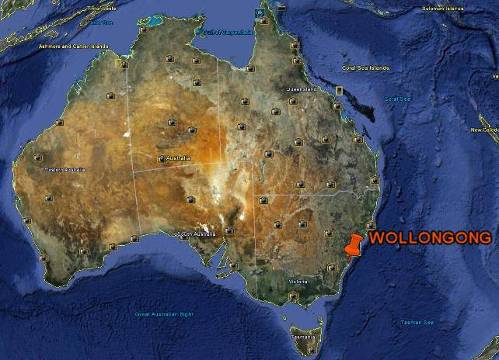
Gintautas Kaminskas lives in Wollongong, Australia. Throughout his life, since his teenage years, his dream and hope was to settle in an independent Lithuania, the country his parents fled during the Second World War. He kept the dream of his ancestors' country alive through many post-war years and in 2008 his dream finally came through; Gintautas moved to Lithuania. Towards the end of 2009 he returned to Australia, disillusioned and sad to have experienced a country totally different from what he had imagined and hoped for. I asked him to explain why.
Here is his story:
I usually don’t like to talk about my family’s story, because most people don’t understand. But I can tell from what you write that you are an idealist and you are trying to understand Lithuania and Lithuanians so I will tell you my story, briefly.
I will start by mentioning that I have a friend in Iceland and I tell him (probably ad nauseam!) that he should be ever so grateful that he was born in his own normal (unoccupied) homeland and therefore automatically grew up speaking his native language in his home, at school at work, and automatically married a woman of his own nationality and therefore naturally spoke his native language at home with his wife and children and now grandchildren. I had none of those privileges.
My parents were married in Kaunas in 1943. If Lithuania had been a Scandinavian country, I would have grown up in Kaunas, happily, and would probably still be there today with my Lithuanian wife and children and grandchildren, just like my friend Jóhann in Reykjavík. But no, not for me. Having experienced one Russian occupation already (1940-1) and having narrowly escaped deportation to Siberia the first time (some of our extended family members weren’t so lucky), my parents decided to flee to Germany in June 1944, just as the Russians were trying to re-occupy Lithuania. My mum was pregnant with my sister, who has born in Germany in November 1944. I was born there (München) on 15 February 1948 (one day short of Vasario 16-toji, unfortunately).
When I think back, I wish my parents had been able to stay in Germany; at least I would have grown up European, close to the languages and countries that are my passion. But no such luck. All the displaced persons had to go elsewhere. Almost all wanted to go to USA, but that was not possible. You had to go where you were sent. We were sent to Canada. Things were OK in Canada I guess, apart from the climate. (We were in place a lot colder than Toronto, where most of the Lithuanians were.) In 1959, when I was 11, my father decided we would move to New Zealand for a better climate ... and better fishing! Ironically, it was this move that made me appreciate my Lithuanian identity and to cling to it like never before. I was teased by the NZ kids for speaking English with a Canadian accent. I hated that. I started telling myself that as soon as I was old enough I would go back to Canada. But after a few years (we were in NZ five years) I started to realise that I was cherishing a silly hope, because I wasn’t really Canadian anyway. So I became very Europe-focused, studying my native language, insisting that my parents speak it with me, and also studying Spanish all on my own from a little textbook. Since Lithuania was blocked to me, my dream became to live in Spain for a while. (Which I did do eventually and enjoyed it immensely.)
Eventually (1964) my sister met an Australian and followed him to Australia, so my parents decided to join them. We settled in Adelaide and it was there that I finished high school and did my B.A. Hons. degree (majoring in Spanish and French). I was a lot happier in Australia because there were more Lithuanians there and I participated heavily in Lithuanian cultural and even sporting activities (basketball). I got a scholarship to do an M.A. in Melbourne (in Spanish/Linguistics) so I left home in February 1970 (the day after I turned 22) and went to Melbourne. It was there that I got married to my first wife, an Australian, at age 22. We were married for 32 years. We lived in Canberra (I was a Public Servant) and we brought up three sons. The highlight of my career was 1979-82 when I was posted to Australian Embassies in Europe, first Rome (I also speak Italian), then Madrid. I wanted to go on more postings but my wife didn’t. As I approached early retirement age (55) I realised that I was never going to feel fulfilled unless I went to live in Europe again, so sadly, I got divorced and left Australia.
My plan had been to take early retirement in 2003 and go straight to Lithuania. As it happens, I took a detour to Montréal, Québec, first. After five years in Québec, I left and went to Lithuania in February 2008 to join my dad who had returned to Lithuania in 2007. I did not live with him because he moved in with a lady friend, but I saw him a lot, and toward the end I was helping the lady nurse him full time. (He died in August 2009.) At first it was wonderful being in Lithuania and speaking my beloved native language all the time, with everyone. But then I started to notice how unhappy so many people are, and how much dishonesty there is among crooked businessmen and tradesman and landlords who don’t pay taxes, bribe-taking public servants, policemen and doctors, people falsely claiming invalid pensions, etc. At a higher level some major scandals have shown that even some judges and Cabinet Ministers are not beyond taking a bribe. The Seimas members are notorious for their greed and many have been exposed as corrupt.
It is mainly my experience with the Lithuanian health system, doctors and hospitals that has caused my greatest disillusionment with Lithuania and has in fact made me too frightened to live there myself. We could not leave my dad alone in hospital. We had to be with him 24 hours a day. We had to bring him food (you would die of malnutrition if you depended entirely on the inadequate meals the hospital gives you), we had to be there to bribe the doctor every few days (the amount of attention they paid to my dad dropped off noticeably if a new bribe was not received every few days), we had to be there to help him go to the toilet and in the end phase to change his nappy, we had to be there to make sure he got his medicine. The hospitals were disgusting. One single toilet on the whole floor for 50 patients! No toilet seat! No paper! No soap! No fly screens on the windows – in a hospital! No lock on the toilet door – men come in and smoke while you are using the toilet – despite the “No Smoking” signs! No facilities for the patients to have a shower or somehow wash themselves. Cold in winter and hot in summer. Hygiene very dubious. An absolute nightmare and disgrace. When my dad died we even had to bribe the cemetery officials to get a decent burial site that wasn’t down in the gully where a big puddle forms and the ground goes boggy every spring. (They deliberately offer you the lousy places to make sure they get a bribe.)
So by the end of 2009 I had left Lithuania too, with aching heart. I blame the bribery and corruption entirely on the Russians. If Lithuania had been left alone (preferably right from 1795, not just 1918!) I am sure it would be like Sweden now. There are a lot of hard-working decent folks in Lithuania and my heart bleeds for them. The only way out of this quagmire that I can see is for journalists and other brave people to campaign against bribery and corruption and to convince the general public to start doing so too. There are a lot of political decisions that need to be made. It is crazy that Lithuania does not have a car tax (automobile registration fees). The Government could raise millions annually like that – every civilised country has it. Same goes for local government taxes (called ‘rates’ in most English-speaking countries). It’s absolutely crazy not having that. You cannot have Scandinavian-style welfare with a Soviet-style taxation system.
I am still an idealist, but now, belatedly, also a realist. I understand that I will be unlikely to see much of an improvement in my lifetime, and therefore I will not be able to end my days in Lithuania, as I had hoped. But the flame of hope burns brightly in my heart that the past sacrifices of brave Lithuanians for the homeland have not been in vain and that one day there will be a living standard in Lithuania not far behind that of the Scandinavian and leading Western European countries. I hope I can make some contribution to the process, no matter how minor. I value your work as a journalist, keep it up! That’s why I have taken the time today to tell you a little about one Lithuanian’s life as an exile.
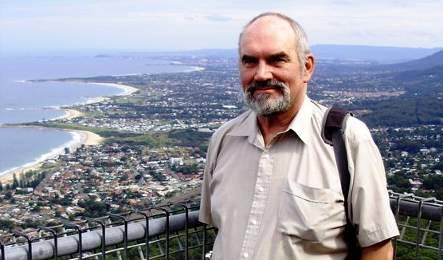
Gintautas Kaminskas
Wollongong, Australia
LITHUANIAN DOCTORS HAVE NO OTHER CHOICES THAN TO STEAL OR ACCEPT BRIBES
Dear Mr Kaminskas,
I was touched by your thought provoking letter to my friend Aage and it made me cry how agonising your experiences were in your ancestral country. This is the Country that people like Aage and myself and many more like us have adopted as we too had dreams of living in a country which held many promises and hopes and our frustrations are not different than yours.
I however take the Liberty to touch upon some of the points raised by you and believe me your observations are 100% true. Let me talk about the Doctors and the Health care System. My own wife, a Lithuanian (born 11 years after you) became a Doctor because her father and many more in the family were Doctors and the Profession was called noble. She did Post graduation in Psychiatry and followed it up with a post graduation degree in Obstetrics and Gynaecology. So with internship etc, it took her nearly 15 years to complete her education. But there were not enough jobs, so she had to bribe heavily and get a job where her princely salary in this Independent country was 450 US$(when US$ was 4 Litas ). Please tell me where can you hire Doctors for such salaries other than the third world countries with lowest per capita income. And this was the story of thousands others. To subsist, to bring up children, to give them good education, they had to either steal or accept bribes and the second choice was the easiest. It however had its own pitfalls, in order to take bribes and still not get caught, they had to bribe those in position of power so as to have kind of Godfathers and those Godfathers in order to remain in that chair for endless years had to find their own Godfathers. And so on. And the story is similar for the Teachers, for very many other Civil Servants and Professionals.
One fine day, my dear wife comes to me and says that she has volunteered to go and work in Afghanistan with the Lithuanian Mission. Shocked and surprised I asked her "Is it For More Money".-she laughed and said that if Lithuania cannot pay her a decent salary here-how would they pay it there-Logical I thought. So I asked where then was the motivation to work in an environment where she could even die. Her answer was unbelievable "I was trained to be a Doctor to serve the Humanity and that is why I want to go there to serve the humanity with dignity as here one when takes bribes, one not only falls in one’s own eyes but most of all in the eyes of the patient and that is the most humiliating experience to go though day in and day out. As for the death-if that is destined -let it be at least I will die for a cause and my country will mourn me as a Hero and not as a thief". It is another story that she could not go as the Budget Cuts came soon thereafter.
5 months back she left for the UAE on a 3 years contract to work as a Specialist in a chain of Hospitals and gets monthly salary equal to 18 months salary in Lithuania. She gets the respect of the people of that Country and of the patients, she holds her head high and she has sound sleep every night. This has meant a lot of sacrifice on her part, to leave her children, and husband behind, to leave the roots of her country, to leave her friends and relations and on the other hand cope up with different work ethics, new language, different culture but she is not the only one. Professionals are fleeing ever so often-question is only of time-some sooner-some later.
If the Legal System here was World Class I could knock the Doors of the Courts to demand justice that My Conjugal Rights have been denied to me by her country which cannot pay its Doctors and many professionals appropriately and yet there are hundreds of Billionaires and Millionaires here within a short span of 20 years of independence.
So Mr Kaminskas, it is not one Aage or One Mr Kaminskas or ten or 100 or 1000 like them who can change the destiny of this Nation-it is the Newer generations who can do but will they! I doubt, I remember my own stepchildren asking their mother after every duty; "How much did you earn today"
Warm Regards to you Mr Kaminskas.
Raj Chaudhary
Owner Director Sues Indian Raja Restaurant, Vilnius
LITHUANIA NEEDS A NEW ‘REVOLUTION’ NOW
Dear Mr Chaudhary
Thank you for your sincere and very interesting feedback. If you have not already done so, I would urge you to give Aage permission to publish your comments. The 'revolution' to achieve Lithuania's independence in 1990-1 needed leadership from the top, but Lithuania needs a new 'revolution' now. This one has to start at the 'bottom', among the people. Lithuanians have to start admitting what is wrong with the country and not just shrugging it off any more: they have to start demanding change. As I have already told Aage, I firmly believe the path to change and reform is first popular demand, followed by the initiative being taken up by journalists and other professionals, including that rare beast "politicus honestus" – if they are not totally extinct in Lithuania.
Best wishes, ypatingai „geros sveikatos“ !
Gintautas Kaminskas
Wollongong, Australia
LET US PRAY THAT THIS COUNTRY WILL TURN AROUND
Dear Mr Kaminskas,
Thank you for a very prompt response and some very caring words.
All I can say is that Hope is a Big asset for the mankind and It is gratifying that in most hearts there is a trace of it-So I too hope for the Better for my adopted Country. Let Me Submit that India at one point of time was described by a World Famous Economist "India is a Rich Country-inhabitated by the Poor."-a saying which is sadly applicable to the Modern Lithuania now (rather than India which has made progress by leaps and bounds) with a young democracy and that reflects sadly on the Powers that be for it to happen. Let us pray that this Country will turn around to be one of the greatest even though small in size but they say Size Never matters.
Kind Regards and I remain,
Yours Truly,
Raj
IF THE BLACK ECONOMY WORKS, THEN THERE IS NO REASON TO FIGHT IT
Hi,
Thanks for the rest of the story of Gintautas. I had written him a letter I suppose while his father was in hospital offering to meet if he was in Vilnius, but he said Kaunas had everything he wanted. Since I am rarely in Kaunas, we never did meet. But my experience in VIlnius has been day to his night. Last May I was a couple of days away from death from a gangrenous gall bladder. The care was fantastic. I paid no bribes and it cost me about 750 in all (self employed so I paid 600 for compulsory state health insurance and we had to buy medicines. I would probably be dead if I had been in the States as I would not have seen a doctor as soon and would have been hours instead of days from death when I would have sought help, which I could not afford. 7500 dollars would not have covered the bill. 20-30 thousand dollars would have been closer to the mark.
To live in this country, you have to network. Almost everything is word off mouth.
Yes, there is a lot of black economy, but if it works, then there is no reason to fight it. For example, police were allowed to collect brines for speeding. Everyone thought that was terrible, except me. The purpose of speeding tickets is to keep those idiots from ramming my car and killing me, and to keep me from doing the same to others. So they got rid of bribes and now there are very few tickets and lots of violations. I don't know how the motorcyclist survived. No one was moving and the light was red for him, so he gunned the engine. The bike ended up under a SUV and he flipped over it. Soon after theyy changed the light system so that yellow is not concurrent and there is a pause between them.
When I came here, lending was tight and building was sparse. Then the banks started lending to everyone, Western style, prices skyrocketed, and now we have a bad economic crisis. Even so had the industry switched in the last few years from building new units to renovating old ones, then they would still be employed because they would be receiving EU funds now instead of holding worthless mortgages. That was caused by Lithuanians not understanding Western practices. It is going to take a while until people here understand the Western world enough to protect themselves.
Iki,
Arturas Bakanauskas
Vilnius
PS: Kaunas is something of a tragedy
Kaunas is also something of a tragedy. For many years, the local government was inept at best, corrupt at worst. So no infrastructure improvements were made and businesses avoided Kaunas like the plague. You can see that in real estate prices. It is more expensive to buy in Klaipeda than in Kaunas. Only in the last few years have they finally started to change things. That is why I surprised by Gintautas's answer that Kaunas had everything. For example, they have never sanded the sidewalks in Kaunas since I have lived here, except perhaps on hills. Laisve al. was an ice slick when I visited in winter. That is one sure way to limit business - keep people at home.
Arturas
LITHUANIA IS FAR MORE INTERESTING AND FULFILLING THAN FINLAND AND USA
Dear Aage, dear Mr. Kaminskas,
I need to reply to the March 27 VilNews, as the very same reasons, which are driving Gintautas Kaminskas away from Lithuania, are keeping me drawn to Lithuania! I was born and raised in Finland, one of those wealthy Scandinavian countries Mr. Kaminskas keeps comparing to Lithuania. I am currently living in the US, in another well organized, wealthy society. However, my life in Lithuania is far more interesting and fullfilling than my lives in Finland and the US. That is because in Lithuania I have a chance to make things better.
Yes, hospitals in Lithuania can be scary places! So for five years now I have been part of International Charity Christmas Bazaar, a charity event, which for example in 2007 collected 100.000 lt for Vilnius University Children‘s hospital. I am part of the change for the better! When my children started schools, I realized that it might take some years for the government to improve the quality of education in Lithuania. So I started a school with my friends! Vilnius International School is now an example and inspiration for many government schools and teachers working in them. My favorite hobby, horse riding, is also still suffering from post-Soviet recession. I joined a private initiative riding association and started organizing competitions, fundraising events and seminars to raise the standards and make opportunities for young riders to dream about big competitions – who knows, maybe Olympics some day! Yes, any of these things I could do in Finland and in the US, but for sure the effect of my actions would not be so dramatic and concrete than in Lithuania. Sometimes the change is not about money. Sometimes I just need to smile and compliment an overworked, stressed government emloyee to get better service.
The quality of life in Lithuania is not about perfect order and wellfare. It‘s about relationships between people and being in control of your own situation, just the way life should be! When a traffice police stops me in Finland, they write me a ticket, wish me a good day and let me go. Everything is very well organized and polite. When a traffic police stops me in Lithuania, they first yell at me for whatever bad thing I was doing. Then they ask ask me where I am from. Then they want to know something about Finland. I might end up spending a good half an hour by the roadside chatting with the policeman. He learns about my life, I learn about his life. So who wants Lithuania to become an organized Scandinavian country? Not me!
No doubt a lot of corruption and robbery takes place in every day life in Lithuania. Well, I have read my 13th century Livonian Chronicles. Lithuanians appear in the pages of the chonicles as mysterious troops from the woods, riding their fast, little horses, spreading fear, stealing everything, killing everyone and again dissapearing into the deep woods. This is something unique! The way Lithuanians still know hundred and one ways to bend the rules has nothing to do with the Soviet era, in my opinion. It is almost 1000 years old tradition of mischievious entrepreneurship spirit!
So please stay in a country where people still matter!
Best regards,
Liisa Leitzinger
Florida, USA
- Bookmark :
- Digg
- del.icio.us
- Stumbleupon
- Redit it
Open letter in commemoration of the first anniversary of the death of Lech Kaczyński, President of the Republic of Poland
- Posted by - (0) Comment
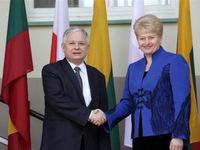
President of Poland Lech Kaczynski on a visit to Lithuanian President Dalia Grybauskaitė in April 2010, just a few days before his tragic death
The below letter was signed by:
Antanas Gailius; Dr. Irena Vaišvilaitė; Prof. Alvydas Jokubaitis; Dr. Paulius V. Subačius; Prof. Danutė Gailienė; Rev. Julius Sasnauskas OFM; Prof. Rimvydas Petrauskas
The letter was written in Polish, translated to English by Lithuanian MP Mantas Adomenas
“It is with burning concern and sorrow that we observe in Lithuania the daily destruction and disdain of the seeds of the European Christian civilisation: the virtues of wisdom and tolerance, humility and the love to one’s neighbour. Several years ago, it would have been hardly credible that unsound conspiracy theories, ill-founded or even deliberately misleading and mischievous statements that are abundant today with reference to the relations between Lithuanians and Poles could become the focus of state politics and a determining factor in the bilateral relations.
We are alarmed by the growing radicalisation and polarisation of society, as well as by the manifestations of pseudo-patriotism, such as witnessed during the 11 March procession. The chauvinist version of history which considers the shared history of Lithuania and Poland as the ‘lost centuries’ distorts the vision of the past, rejects and smears the common spiritual, political, and cultural heritage of the two nations – from the Battle of Grunwald to the Constitution of the 3rd of May, from Our Lady at the Gate of Dawn to the joint struggle against the enemy of the two nations, both in 1863 and in 1989.
We embarked on the 21st century having overcome, it seemed, the quarrels of the past and having preserved the brotherhood of the two Christian freedom-loving nations. Now we must put every effort in order to safeguard this peace and unity. Our common faith obliges us to seek peace. Therefore, more than ever should we recall the words of the Apostle who said that “there is neither Jew nor Greek” in the eyes of the Church and faith. Lithuanian citizens of the Polish origin who consider themselves Poles constitute an integral part of the Lithuanian society and the state.
We lived, we live, and we will continue to live together with them. Radicalism will not help us find a common ground or jointly build our common state. On the contrary, it promotes distrust and hostility and prevents the possibility of peace. We invite everyone to surmount political discord, extinguish the fire of polarisation that is often fuelled by short-lived political ambitions, and seek agreement with the Lithuanian Poles as our fellow citizens who, like everyone else, want to live their lives and build their future, as well as that of their children, in peace and harmony on this soil.
Our ability to live with Poles in concord demonstrates our maturity and Europeanism. Being the larger community we are obliged to offer our hand first and to start the process of reconciliation, which will not be easy and will require much effort. The approaching holiday of the Resurrection urges us to seek concord, for how will we be able to celebrate Easter without having reconciled us with our neighbours?”
Vilnius, 10 April 2011
Read more at:
http://www.economist.com/blogs/easternapproaches/2011/04/poland_and_lithuania_rare_bit_good_sense
- Bookmark :
- Digg
- del.icio.us
- Stumbleupon
- Redit it
Knights of Lithuania since 1913
- Posted by - (0) Comment
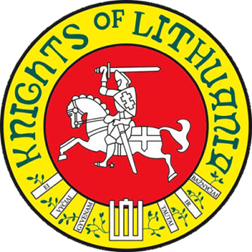
The Knights of Lithuania is an American organization of Roman Catholic men and women of Lithuanian ancestry and their spouses. Adhering to the motto: "For God and Country";, the Knights of Lithuania aim to keep alive among its members an appreciation of the Lithuanian language, customs and culture while also stressing the importance of Roman Catholic beliefs.
Organized on 27 April 1913, the Knights of Lithuania were begun as a youth organization. Its purpose was to unite the Lithuanian youth living in the USA, and through them, preserve Lithuanian culture and restore freedom to Lithuania, then divided between Russia and Germany. It has since become a family organization. St. Casimir, patron saint of Lithuania's youth, is honoured as the organization's patron.
Read more at: http://www.knightsoflithuania.com/
and: http://republicanherald.com/news/knights-of-lithuania-hold-regional-meeting-in-frackville-1.1130806
- Bookmark :
- Digg
- del.icio.us
- Stumbleupon
- Redit it
Lithuania and the Soviet Union 1939-1940
- Posted by - (4) Comment
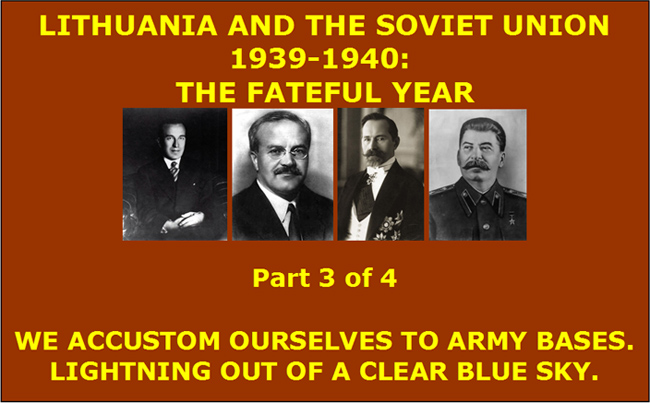
Dear readers,
On 15 June 1940, Soviet Russia invaded Lithuania. This was the beginning of Lithuania’s loss of freedom for more than fifty years and the beginning of one of the saddest and most tragic parts of Lithuania’s history. There has been much talk and speculation about how this invasion came about and what Lithuania did, or as some would accuse didn’t do, to prevent it. To shed clear light on this topic, we would like to share with you parts of the personal memoirs of Juozas Urbšys who was a member of the group that personally met with Vyacheslav Molotov and Stalin. After reading these fascinating and very informative memoirs we are sure you will have a better appreciation for the precarious situation the leaders of the then free Republic of Lithuania were in and what they did to try to protect the lives of the Lithuanian people.
We will share these memoirs in 4 parts. Here is part 3 of 4
WE ACCUSTOM OURSELVES TO ARMY BASES. LIGHTNING OUT OF A CLEAR BLUE SKY.
p. 23
Once the mutual assistance pact had been signed the Soviet Union lost no time establishing army bases in Naujoji Vilnia, Gaižiūnai of Jonava, Prienai, and Alytus. Questions arose daily regarding the deployment and stationing of troops but, with both sides acting in good faith, they were satisfactorily answered.
Pozdniakov was now minister extraordinary and plenipotentiary.
The sentiments that had been stirred up by these events subsided and life went on as usual. While negotiations were underway, or whatever passed for "negotiations", we defended our position and points of view. Now that there was a treaty, the government of Lithuania had resolved to faithfully abide by it though whether the other side would really hold to article VII, regarding sovereign rights and non-interference in internal affairs, neither the members of government nor the ordinary citizens were wholeheartedly convinced.
(...)
(Government officials calmed the public by reiterating that Lithuania remained, as before, an independent and entirely sovereign nation. These official statements were repeated in the Soviet press, but to his query whether or not Stalin or Molotov would receive him in an unofficial capacity to discuss these issues, Urbšys received no reply.
In 1940, around the middle of May, Urbšys was invited by the General Secretary to the People's Commissar for Foreign Affairs, Sobolev, who informed him that of the three Baltic Republics Lithuania had the most satisfactorily dealt with its Soviet bases. Not long afterwards, Urbšys was visited by Soviet General Lokstinov who informed him that two Soviet soldiers had apparently been apprehended by some Lithuanians and locked in a celler until they could escape. To Urbšys this seemed barely credible and he told Lokstinov that this sounded like something from "A Thousand and One Nights." Following this, on May 25, 7940, Molotov summoned Natkevičius to the Kremlin, was most unamica-ble towards him, and read the written statement which the Soviet government was sending the Lithuanian government. The statement posited that yet another two Soviet soldiers had disappeared in Lithuania and that the Soviet government knew for a fact that their disappearance was organized by individuals who were aided by the Lithuanian government. The statement went on to say that the Soviet government regarded such actions as provocations leading to serious consequences and demanded that the Lithuanian government cease such actions and immediately find and return the missing soldiers or else the Soviet government would be forced to use whatever means necessary to obtain satisfaction. Urbšys's impression was that Stalin and Molotov were picking a fight.
Following a meeting of the President of Lithuania and his ministers, and after an investigation of the allegations found them to be baseless, a note was transmitted to Pozdniakov stating that the Lithuanian government found no incriminating facts but that it would continue its inquiry if it were given additional data regarding the individuals and offices which Molotov had in mind.
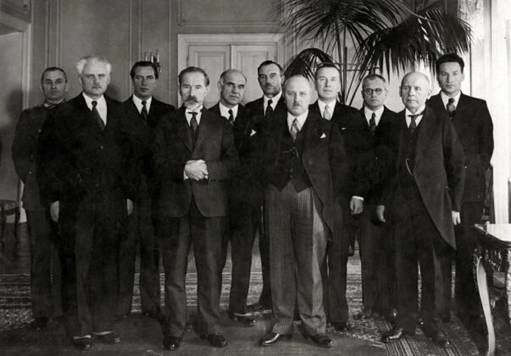
21-ojo Ministrų kabineto nariai su Lietuvos Respublikos Prezidentu A. Smetona prezidentūroje.
Iš kairės: K. Musteikis, A. Merkys, A. Tamošaitis, A. Smetona, E. Galvanauskas, K. Skučas,
K. Bizauskas, J. Urbšys, J. Masiliūnas, K. Jokantas, J. Audėnas. Kaunas, 1939 m.
Molotov's response to Natkevičius was that he did not take the note seriously. Furthermore, he had no intention of providing any further information, but rather, continued to angrily assert that the Lithuanian government refused to take any steps whatsoever.)
p. 26
What sort of steps did he deem necessary? Only the gods and, of course, he and Stalin, knew.
Not long ago Molotov had said that "any imperialist country would occupy Lithuania and that would be that. Unlike us who do not do such things. We would not be Bolsheviks if we did not search for new ways." The ways may be new but was not the end result the same as from the old ones?
Day after day, the atmosphere surrounding the relations between the two countries was made more and more complex (just as Ribbentrop and Hitler had done before taking Klaipėda.) Everyday more and more of a smokescreen was created, apparently to cover up these "new ways."
A lot of "smoke" was not necessary in Europe at that time. As the war begun by Hitlerite Germany spread, everyone had enough problems of his own. What is more, the West was simply waiting for the Soviet Union to make a move in Germany's direction — with those two battling each other, the easier it would be for the West.
The official publication "Falsifikatory istorii — Historical information. Ogiz, Gozpolitizdat, 1948," on page 63, portrays and justifies the massive entry of Soviet troops into Lithuania in mid-June of 1940 thusly:
In this way the Soviet Union's defense against Hitlerite aggression was also strengthened in the North by moving the line of defense in the Leningrad region 150 kilometers to the north of Leningrad, up to and including Vyborg.
But that does not mean that the formation of the "Eastern" front has been completed from the Baltic to the Black Sea. Pacts had been signed with the Baltic countries but there were still not enough Soviet troops necessary to maintain the defenses. Moldavia and Bukovina were once again formally joined to the Soviet Union, but there again, there were not enough Soviet troops for defense purposes. In the middle of June, 1940, the Soviet army marched into Estonia, Latvia, and Lithuania. That same year, on June 27, the Soviet army entered Bukovina and Moldavia, both of which had been rent from the Soviet Union following the October revolution by Romania. This is how the Eastern front was formed from the Baltic to the Black Sea as a counter to Hitlerite aggression."
So that is why the Soviet army entered sovereign independent republics. Evidently, Lithuanian, Latvian, and Estonian territory was needed to protect the Soviets against Hitlerite aggression (which at the time was only a possibility since aggression against the Soviet Union broke out but a year later.)
(...)
p. 27
On May 28, 1940 the Lithuanian government delivered another note to the government of the Soviet Union informing it that it had created a special commission to investigate the Soviet allegations and repeatedly asking it for more information without which it could not begin its work. The Lithuanian government proposed that representatives from the Soviet garrisons also be a part of the commission.
However, that same evening, TASS publicly declared the accusations against Lithuania. The situation was becoming tragic. Day in and day out Stalin and Molotov were terrorizing the Lithuanian government with reproaches and accusations which it could neither trace nor verify since the authors of these accusations were maliciously sabotaging the investigations. To keep the atmosphere from heating up any further and still believing that relations could be normalized, the Lithuanian government was not making any public declarations. At any rate, it could only categorically deny the accusations made against it and thus come into open conflict with the Soviet Union. Understandably, such a forced silence on the part of the Lithuanian government in view of the accusations, publicly and categorically, lodged against it was making the Lithuanian people very uneasy.
TASS's declaration alluded to an event which actually occurred involving a Red Army soldier by the name of Butayev. The soldier had deserted his unit and gone into hiding somewhere. The Soviet garrison command asked Lithuanian authorities to find Butayev and return him to his unit. The Lithuanian police had a difficult time finding him, more so since they could not publicize the search. They finally succeeded in locating him. When the police asked him to come with them, Butayev jumped out the window and started to run. The police pursued him and Butayev, seeing that there was no escape, shot himself. The incident was reported immediately to the Soviet army command in Lithuania which sent its own commission in to investigate. The commission made a sketch of the area and took possession of the corpse. Initially it was thought that he had shot himself through the mouth since he was bleeding from that orifice. After the Soviets had examined the body and performed an autopsy, it was evident that he had shot himself in the chest. At first there was some doubt as to whether Butayev had shot himself or had been shot at, but the autopsy made clear that he had committed suicide. That was how this particularly unpleasant incident was dealt with at the time. Now, however, TASS had interwoven this incident with its other insinuations seemingly hoping that it would lend them greater credence.
We would like to thank Lituanus for their kind permission to share this article with you.
LITUANUS
LITHUANIAN QUARTERLY JOURNAL OF ARTS AND SCIENCES
Volume 34, No. 2 - Summer 1989
Editor of this issue: Antanas Dundzila
Memoirs of Juozas Urbšys
Translated and edited by Sigita Naujokaitis
http://www.lituanus.org
- Bookmark :
- Digg
- del.icio.us
- Stumbleupon
- Redit it
Estonian production up 31% in one year!
- Posted by - (0) Comment
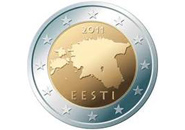
In February 2011 companies operating in Estonia produced 31 percent more industrial goods than the year before, which is by far the largest growth in the European Union, according to Eurostat.
The closest competitor in goods production increase was Sweden (16 percent) followed by Lithuania (14 percent) and Germany (13 percent).
In February all EU member states managed to keep their production growing compared to the same month a year before, with the smallest increase registered in Holland (0.4 percent) and Denmark (0.5 percent).
Compared to January, the avarage industrial production growth in February was 0.2 percent for the EU, while in the Eurozone it was 0.4 percent.
Statistics also showed that compared to the same period of 2010 the production of industrial goods in the EU rose by 7.3 percent while the increase in the Eurozone reached 7 percent.
Source: http://news.err.ee
- Bookmark :
- Digg
- del.icio.us
- Stumbleupon
- Redit it
Belarus authorities speculate that extremists or a lone psychopath may be behind the attack
- Posted by - (0) Comment
![]()
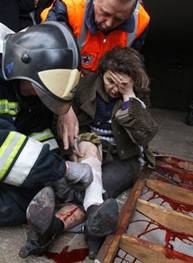
AP
AFP
Belarus authorities have arrested a man suspecting of planting the bomb on the Minsk metro that killed 12 people in the worst attack in its post-Soviet history.
Authorities have speculated that extremists or a lone psychopath may be behind the attack but have so far failed to offer conclusions two days after an attack that stunned a country completely unaccustomed to a strike on this scale.
Twelve people were killed and 200 injured in the attack, which was caused by a bomb apparently set off by remote control placed in a bag at a metro station close to the headquarters of autocratic president Alexander Lukashenko.
Advertisement: Story continues below
Deputy prosecutor Andrei Shved said police had arrested two suspects, including a man suspected of planting the bomb at the station.
Shved did not make clear when the men were arrested or if their arrest came after that of three men detained a day earlier.
"The first confessions have been obtained," he said, quoted by the Interfax-Zapad news agency.
"With a great deal of probability we can assume that one of the detained is the perpetrator," Shved added, pointing to video evidence from the Oktyabrskaya station of the Minsk metro where the bomb went off.
"On the video footage it is clearly visible how the suspect gets off a train at Oktyabrskaya, stands on the platform, leaves a bag behind on a bench and leaves, fiddling with something in his pocket.
"After that, the explosion went off."
A day earlier, the authorities released a picture of a man the KGB said was of "non-Slavic appearance" and was a key suspect. But it was not clear if he was one of those arrested.
Belarus KGB chief Vadim Zaitsev denied speculation that the bomb appeared to have been an amateur operation, saying it contained a large amount of metallic objects aimed at causing destruction.
In a sign of the authorities' uncertainty about the motives for the blast, Zaitsev said three versions were being examined - a bid to destabilise the country, a plot by extreme youth groups and an action by a lone psychopath.
- Bookmark :
- Digg
- del.icio.us
- Stumbleupon
- Redit it
Israeli terrorism experts arrive in Minsk
- Posted by - (0) Comment
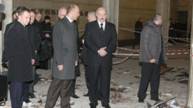
Belarus President Alexander Lukashenko looks at blast site inside the Oktyabrskaya subway station in Minsk, Belarus, Monday, 11 April. (AP / Andrei Stasevich, Belta)
A special group of Israeli experts, composed of seven people, arrived in Minsk today morning to assist the Belarusian authorities in investigating the terrorist attack, occurred at "Kastrychnitskaya" station in Minsk subway on 11 April. The Israeli delegation includes medical experts, experts in the field of combating terror, the police experts to identify the mortal remains and the representatives of the General Security Service.
- Bookmark :
- Digg
- del.icio.us
- Stumbleupon
- Redit it
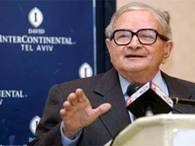
Former agent of the Israeli intelligence service Mossad, a member of the government and current adviser to Israeli Prime Minister of Pensioner Affairs, Rafi Eitan, arrived in Belarus the same day the blast took place. Representatives of the Israeli Embassy have told the Belarus newspaper ‘Telegraf’ that the former Israeli Minister is on a private visit.
Rafi Eitan was born in 1926 in Israel, Kibbutz Ein-Herut. He served in Palmach, first worked in the General Security Service (Shin Bet), and then in the foreign intelligence (Mossad), where he headed the Operations Department.
Rafi Eitan is banned to enter the U.S. territory since he was implicated in the recruitment of an Israeli agent in the U.S. Navy. According to ‘Telegraf’ the former minister maintains good relations with Cuba.
- Bookmark :
- Digg
- del.icio.us
- Stumbleupon
- Redit it
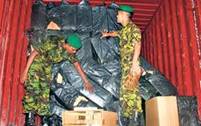
European Union authorities say that they have arrested nine people in Lithuania for attempting to smuggle tens of millions of cigarettes to several countries.
Law enforcement from Poland, Germany, and Lithuania seized 70 million cigarettes in the sting operation, “preventing losses of 6 million euros (US$8.6 million) to the European taxpayer,” the EU’s Anti-Fraud Office said Monday.
The nine suspects were allegedly smuggling the contraband from Ukraine and Russia to other European countries. They are now being detained for three months and will await trial in Lithuania.
The Anti-Fraud Office said that cigarette smuggling costs European taxpayers 10 billion euros (US$14.4 billion) a year
http://www.theepochtimes.com
- Bookmark :
- Digg
- del.icio.us
- Stumbleupon
- Redit it
I admire your work and efforts to “spread the gospel” about wonderful Lithuania
- Posted by - (0) Comment
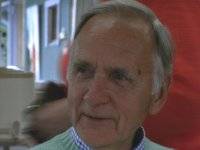
I join the very large group of people, who admire your work and efforts to "spread the gospel" about wonderful Lithuania and your serious endeavours to induce Lithuanian decision makers to improve on the not-so-wonderful aspects of Lithuanian political and economic life.
Peter Modeen, Costa del Sol, Spain
- Bookmark :
- Digg
- del.icio.us
- Stumbleupon
- Redit it
VilNews e-magazine is published in Vilnius, Lithuania. Editor-in-Chief: Mr. Aage Myhre. Inquires to the editors: editor@VilNews.com.
Code of Ethics: See Section 2 – about VilNews. VilNews is not responsible for content on external links/web pages.
HOW TO ADVERTISE IN VILNEWS.
All content is copyrighted © 2011. UAB ‘VilNews’.

 Click on the buttons to open and read each of VilNews' 18 sub-sections
Click on the buttons to open and read each of VilNews' 18 sub-sections 















.jpg)



